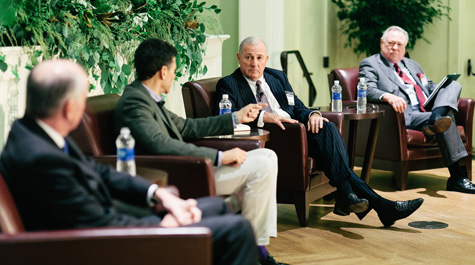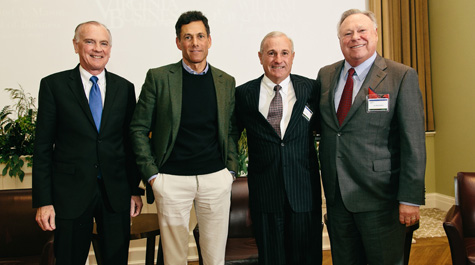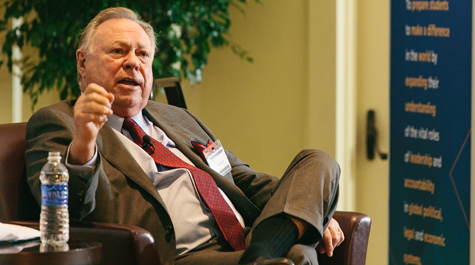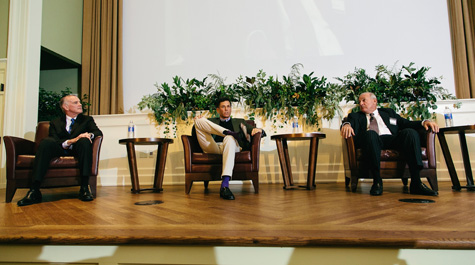From Ebola to the NFL, McGlothlin Fellows Talk Solutions
The McGlothlin Leadership Forum Fellows tackled some of the thorniest issues facing the nation in a wide-ranging panel discussion at William & Mary’s Raymond A. Mason School of Business Oct. 22.
Moderator and forum namesake James W. McGlothlin ’62, J.D. ’64, LL.D. ’00 and the three fellows covered everything from “Gamergate” to the Affordable Care Act in the hour-and-a half-long plenary session held before a packed Brinkley Commons Room at Miller Hall. Topics included all of today’s major headlines, including the NFL’s response to domestic violence and the federal government’s reaction to Ebola.
Rarely did all three fellows – Legal Services Corp. President James Sandman; Clayton, Dubilier & Rice retired Senior Partner George Tamke and Zelnick Media Owner Strauss Zelnick – entirely agree on any one question posed by students from the Raymond A. Mason School of Business or the W&M Law School.
For example, all said raising the federal minimum wage is desirable, but they differed on the details, such as the magnitude of an ideal increase and anticipated effects.
“We have enough of a history in our country of increases in the minimum wage to be able to see what the effect on the economy has been following increases,” Sandman said. “That history shows that the doom-and-gloom predictions of people who claim that increases in the minimum wage are job killers and bad for the economy, those predictions aren’t supported by history.”
Sandman said the question becomes how much of an increase the current economy can endure. He would be concerned about jumping from the current rate of $7.25 to $15 per hour, “which some may advocate is a living wage,” he said.
Tamke countered that the very industries most affected by a federal minimum wage increase show some of the slimmest profit margins and highest labor costs. Anticipating a mandatory wage increase, presidents and CEOs are increasingly looking for ways to automate, he said.
“You run a McDonald’s franchise, your margins are probably 3 or 4 percent and your most significant cost is labor,” he said. Increasing minimum wage “directly impacts the bottom line and their ability to maintain competiveness, given a fundamental inability to raise prices … There is a level of diminishing returns here and you have to be very careful about the unintended consequences.”
McGlothlin agreed. “What really worried me was that businesses that cannot raise their revenues enough to support a higher minimum wage would only have one alternative, and that's to go out of business.” A good intention to take better care of workers instead would leave them unemployed, he said.
“There's probably some benefit to increasing minimum wage in growth as productivity grows,” Zelnick said.
But like the others, he warned of unintended consequences of an across-the-board, dramatic increase. “I guess I'd say if you really parse minimum wage and looked into part-time versus full-time, industries and the like, there is probably an intelligent way to distinguish between broad exploitation and things that could be good for the economy.”
The panel discussion was one of the highlights of the three-day McGlothlin Leadership Forum, which brought together fellows, students, faculty, alumni and community members to discuss economic, political and legal issues. The annual forum, which provides the William & Mary community the opportunity to engage with pre-eminent leaders in business and law, is the vision of James W. and Frances G. McGlothlin.
The McGlothlins created the forum to prepare students to make a difference in the world by expanding their understanding of leadership, integrity, accountability and revolutionary thinking.
About William & Mary Law School
Thomas Jefferson founded William & Mary Law School in 1779 to train leaders for the new nation. Now in its third century, America's oldest law school continues its historic mission of educating citizen lawyers who are prepared both to lead and to serve.



